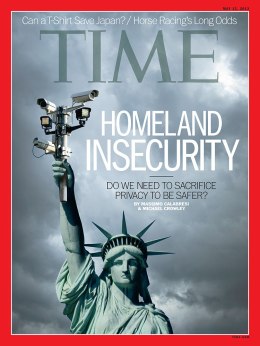
The contest between liberty and security has been with America since its founding. It has been fought on the public stage by every President from George Washington to Barack Obama. Each generation, from those facing rebellion in the 1860s to those pushing back against government intrusions a century later, has debated where to strike a balance. But in the dark world of 21st century law enforcement, where terrorist threats can hide behind our most cherished freedoms, the battle sometimes takes place in government documents so obscure that they escape public notice.
Take the case of the FBI’s Domestic Investigations and Operations Guide. In October 2011, Obama’s Justice Department, mindful of increasing signs of homegrown terrorism, quietly granted FBI agents new powers that disturbed civil libertarians. Federal agents could now data-mine vast stores of information about individuals without making a reviewable record of their actions. They could conduct extensive physical surveillance of suspects without firm evidence of criminal or terrorist activity. They could interview people under false pretenses. They even had wider freedom to rummage through the trash of potential sources.
(MORE: A Dead Militant in Dagestan: Did This Slain Jihadi Meet Tamerlan Tsarnaev?)
But the new guidelines also featured added restrictions on an especially sensitive area of FBI counterterrorism work: mosques. Under the new rules, agents could no longer enter a religious organization without special new approval—in some cases directly from FBI headquarters. Moreover, according to still-classified sections of the new rules made available to Time, any plan to go undercover in a place of worship—a tactic employed by the bureau after Sept. 11, 2001, that drew protests from Muslim Americans and at least one lawsuit from a California mosque—would now need special approval from a newly established oversight body at Department of Justice headquarters called the Sensitive Operations Review Committee, or SORC.
(PHOTOS: Joy and Relief in Boston After Bombing Suspect’s Arrest)
On January 18, 15 months after those guidelines were issued and just a few days before Martin Luther King Jr.’s birthday, a young immigrant from the Russian region of Dagestan, Tamerlan Tsarnaev, stood up in his mosque in Cambridge, Mass., and confronted his imam when the religious leader extolled King’s greatness. Tamerlan yelled that the preacher was a “nonbeliever” and was “contaminating” his followers’ minds. The congregation shouted Tamerlan down and hounded him out the door. The FBI didn’t learn about the episode, or the fact that Tamerlan had been posting radical Islamic videos on his YouTube page, until after three people were dead on Boylston Street.
There’s no telling whether closer monitoring of Tamerlan’s mosque might have stopped him. But the Tsarnaev case raises, once again, hard questions about how we want to apply the Bill of Rights and the post–Civil War guarantees of equal protection in our time. Where is the limit to what Washington should do in the name of our security? Do Americans want undercover agents spying on their prayers? What aspect of privacy might we give up in the interest of better security? Perhaps the FBI agents who were alerted to Tamerlan’s radical turn by Russian intelligence in 2011 should have monitored his Internet activity long enough to spot his terrorist sympathies. Should Americans let the government sniff through their communications? According to a new Time/CNN/ORC International poll, nearly twice as many Americans are concerned about a loss of civil liberties as are worried about a weakening of anti-terror policies.
(MORE: Exclusive: Imam of Mosque Visited by Bombing Suspect Speaks to TIME)
It is still unclear whether Tamerlan Tsarnaev, whose body is being released to his relatives, and his younger brother Dzhokhar, now in custody, were self-radicalized and acted independently—or whether they acted at the behest of an ideological mentor or foreign organization. Congress and U.S. intelligence agencies are now studying whether warning signs were tragically missed. But it seems increasingly clear that the activities of the Tsarnaev brothers and many other would-be homegrown terrorists can be detected not through travel records and financial transactions but only through the more opaque realm of online activities and religious attitudes.
With al-Qaeda weakened abroad but self-taught, wi-fi-empowered jihadis increasingly a threat at home, balancing freedom and security is an old problem we’ll have to get used to once again.
The Road to Radicalization
In hindsight, Tamerlan Tsarnaev followed a gradual path toward radicalization that authorities have seen many times before. His identity was not religious when he moved to the U.S. from Dagestan, a province in southern Russia, in 2003. He became an avid boxer who dreamed of a professional career. He was also a bit of a libertine, a drinker and smoker who sported reflector sunglasses, tight jeans, even white fur—“dressed like a pimp, kind of Eurotrash,” as one neighbor told the Washington Post. He played violin and piano. While waiting to register for a boxing tournament, he once sat down at a piano in the room and played an impromptu 20-minute classical piece, according to a New York Times account, leading the gathered boxers to erupt into applause.
Long before the blasts on Boylston Street, however, people around Tamerlan could see him changing. He stopped smoking and drinking and started to complain about the U.S. government. He began to study the Koran. His boxing career hit a dead end. The next year his parents moved back to Russia. Although he had married an American woman (who converted to Islam), he was becoming isolated and said he had no American friends. Soon his flashy style of dress was gone and he sometimes wore a beard. He was also angry and increasingly confrontational, especially on matters of religion and society.

